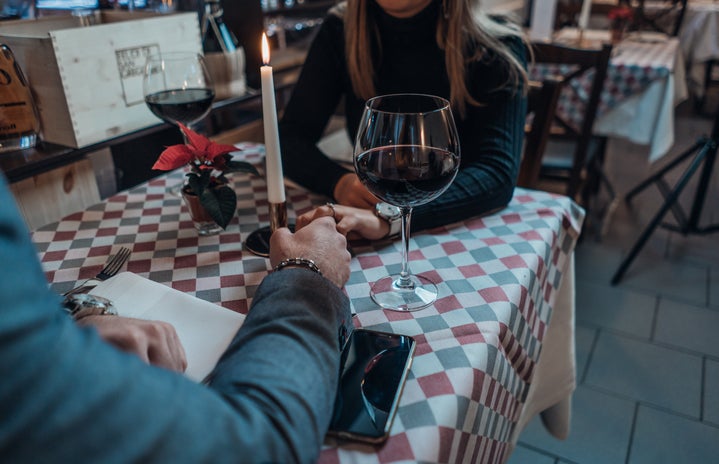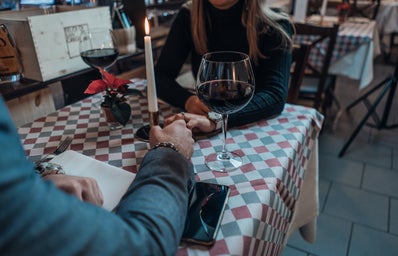One of the most conflicting and deeply prolonged dilemmas I have experienced is whether to completely disregard the traditional notion that the man should chase the woman or not. Living in a postmodern, feminist, and anti-traditional society means many things–one of them is most certainly the urge to question your own dating culture. I personally think about this most days, predominantly because of TikTok and Instagram throwing endless dating approaches at my frustrated head. Ironically, all of them contradict each other–the male dating coach encourages the most obvious ‘confess your feelings, otherwise, how will they know?’. Then, the female-based self-care Instagram page shouts the increasingly popular: ‘If he wanted to, he would!’. Either way, dating advice on social media is always imposed on me, even when I don’t ask for it.
Most women are exposed to a lot of traditional representations of relationships from a young age. My favourites were Romeo and Juliet, Grease, Titanic, The Great Gatsby, or practically any Disney movie. Each of them depicts heterosexual relationships in the same exact way: the boy gets the girl, whilst she waits patiently. Even my mother would always tell me that a guy should always come to you. It is hard to pinpoint where these stereotypes emerged from, though there is a prevalent distinction between gender expectations. The male is conventionally viewed as the bold breadwinner, in an almost animalistic way, whereas the woman is a tender housewife. Almost everyone is brought up with the image of their mother staying at home while their father worked. Other notions of tradition are well represented in Hélène Cixous’ feminist theory, for example, “The Greeks, who are usually taken as founders of Western philosophical tradition, conceptualised the universe in terms of ‘binary oppositions’”. Whilst learning about this theorist last year, she particularly struck me in the way that she dichotomises the two genders. She continues:
Their metaphorical structure places women in the realm of all that is negative, evil and dangerous, in need of control
Hélène Cixous
Despite the obvious dispute of women being ‘evil’ like we are the devil’s first-born, it is the last part that gave me an epiphany–men feel the need to control women. This is perhaps why they will not let the women do the romantic pursuing. I hear it circulating through our society everywhere: men should text first, men should plan the date, men should turn dating into a serious relationship, men propose to the woman, the man kisses the bride, etc. Simply put, men take control because that is the ideology they are taught. It is even scientifically integral–the sperm swims to the egg, not vice versa! However, I can’t help but question whether this is becoming outdated, more importantly, women seem to want to shift the narrative and make the first move themselves. Is society moving away from tradition?
Many 1 a.m. nights are spent mindlessly swiping through Bumble, which is very slightly better than any other dating app due to the mere fact that women text first. I guess this gives me a sense of liberation, even if vaguely overpowered by the empty and anticlimactic satisfaction it gives. Though, I acknowledge in my mind that I am still in dilemma as to which gender should make the first move; I don’t believe I can decide any time soon. I am fully in support of women going up to a man with all the confidence they can muster, asking them on a date, and asking their name first in a bar. On the other hand, women are told that if a man is interested, they will approach without you having to do anything, and it wouldn’t be natural for a man to sit and watch the woman do all the work. Thus, he isn’t interested. Plus, there’s the danger of getting your drink spiked at a bar if you attract the wrong company, most of which is derived from the fear of what men are capable of.
Chivalry is not dead, but it sure is slowly dying. Not only is it easier to wait for the man to approach you, but it is probably also safer and more preferred. Besides, the most desirable characteristics in a boyfriend, in my opinion, stem from the image of protectiveness and safety. Ladies, when was the last time you had a man open a door for you? How many of you regard it as chauvinistic as opposed to gentlemanly? Indeed, if a woman doesn’t feel the need to be protected by a man, it leads the man to feel defeated and useless. They lose the most basic aspects that make them ‘manly’. Almost every modern woman will confess that a man is not ‘a necessity’, but ‘a want’ and that all men are replaceable (even I hold this belief). Perhaps it is this that scares men and is the reason why fewer and fewer men do the chasing.
I find today’s dating culture so utterly complicated because society has constructed too many unnecessary aspects to the process. Should you play mind games? Should you first meet someone virtually? How long should you wait to text back? How long until you ask the question of ‘what are we?’ Should you depend on the ‘if it’s meant to be’ mindset? Is there an attraction towards playing hard to get? Or is that just immature? What the heck is the difference between ‘seeing each other’ and ‘dating’??? (To my shock, there is one). These questions never end. Unfortunately, dating is no longer as easy as it used to be. Women and men are developing either anxious or avoidant attachment styles. For example, the more I casually talk to guys, the more I realise I become anxiously attached to neither the person nor how they act but, ultimately, the image of them that I create in my head. I seem to dissect every single action or text, what these things might mean as if they will hugely impact my future. They won’t. Perhaps this is the biggest obstacle most people face when dating, thanks to the rise of social media.
As well as these awkward in-between-stages questions, there is, of course, the whole new problem of the ‘situationship’ (another modern term us Gen Z’s have created). This is the limbo-like stage which entails two people acting like they are together, as if they’re more than friends, doing everything other than the missile that is committing to dating. In short, they have relationship privileges without being in one. It would usually be here where the expectation is imposed onto men to take the situation further. However, since more and more people are getting into ‘situationships’ rather than relationships (either consciously or unconsciously), modern dating standards are hitting the floor. Don’t get me wrong, I believe there are still some chivalrous men in the world. Yes, they may still expect a serious relationship, expect for them to do all the pursuing, meet the same needs as you. But most males are shyly pulling away from this tradition. Evenly, most women in this generation aren’t used to chivalrous men, so they develop the tendency to accept the bare minimum of attention. As embarrassing as it is, I’ll get overly enthusiastic when I make eye contact with a guy on the tube who I will never see again.
Maybe, it doesn’t have to be as complex as we set it out to be. It can be as simple as being honest with the other person. It may require both the male and female to inhabit their own femininity and masculinity since this is what both genders entail. A male will take the initiative and let the female know he is interested. The female will decide whether she has developed a liking and will reciprocate. There isn’t a doubt that these qualities are inherent in the most basic gender roles, the innate male instinct being dependent on their testosterone, therefore they aim to act as a protector. Nevertheless, the memory of talking to a friend who studies psychology pivots my thought process. She states the opposite: a man will only truly open up to a woman romantically if he feels he can be vulnerable only with her. In fact, some studies show that testosterone blocks vasopressin which is the vital bonding hormone. During a marriage or long-term commitments, this hormone is increased as opposed to testosterone. So, part of my dilemma is to question whether men fear commitment because they have no choice but to decrease their masculinity.
Does the suppression of testosterone ultimately imply that the man is less likely to chase a woman once they’re together? After one has obtained the ‘prize’, what is there to chase? The societal belief that a male must put up a ‘strong, manly front’ dissipates only when his life starts to involve a serious relationship. Other than that, he will do anything to boost his ego and accept any radical challenge a woman will give him in the casual stages. To prove that a man is an alpha male, his aim is to perform acts of gentlemanly etiquette: paying for her, walking on the side closer to the cars, buying her flowers, making sure she gets home okay. However, even these simple acts seem to be replaced by the incredibly tedious ‘you up?’ texts.
I realise I have once again entered a rabbit hole into my own internal documentary series, named ‘My overthinking of society’s dating culture–even though I should be stressing over more important things like climate change’. At the end of the day, it is 2021, and a woman is fully capable of chasing a man. Even though traditional gender roles are still present in society, it all comes down to one’s choice. A man can pursue if he wants to; a woman can pursue if she wants to. I personally would prefer the attention of a chivalrous man who makes me feel wanted. Some women prefer to not waste time and take the initiative themselves. As long as the fundamental end of a non-toxic relationship is achieved and both parties communicate their needs, the modern dating process can be down to subjective opinion. Therefore, to say that society is rejecting romantic tradition would be wrong, instead, it is perhaps shifting somewhere in between tradition and transgression.


